11 Reasons Your Car Jerks When Accelerating (and How to Fix It)
Nothing ruins your drive like a car that jerks when accelerating. Not only is it embarrassing as other motorists think you don’t know how to drive, it can mean you may be looking at expensive repairs if you don’t get it figured out soon.
Let’s look at some of the most common causes of a jerking or lurching car and what you need to do to get it fixed.
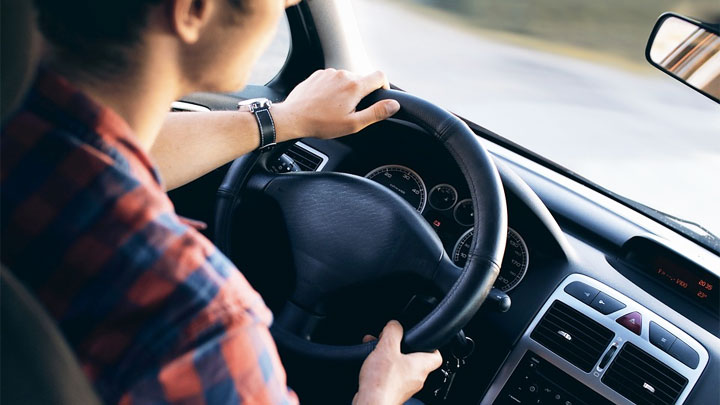
Related: Car Jerks When Braking or Idling
Why Your Car Jerks, Lurches, or Stutters When You Accelerate
When car feels like it’s jerking, surging, bucking, or stuttering after you step on the gas pedal, you know that something is off.
Your vehicle may also feel like it’s dragging something when you accelerate or even jerk or jump when releasing the accelerator. With all these things, it’s usually a result of inadequate fuel, air, or spark during the combustion process.
However, there are other things that can be the cause. You want to find and fix the problem as soon as possible before it gets worse and costlier to fix.
See Also: 9 Reasons Your Car Makes a Rattling Noise While Driving
#1 – Dirty Fuel Injectors
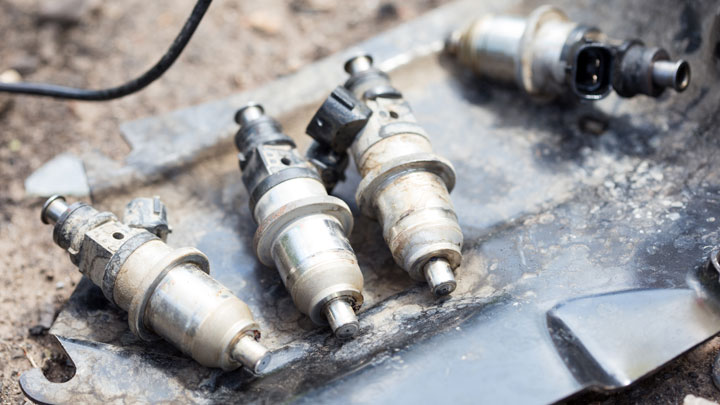
This is a common and annoying problem that can be responsible for a variety of issues. Dirty injectors can cause your car to lose power and make your car jerk while driving at constant speed or from a stop due to frequent engine misfires. You can also hear as the engine stutters from inconsistent fuel intake.
Cleaning the injectors should be done regularly to avoid this problem. Thankfully, this process is quite easy using a fuel injector or fuel system cleaner.
However, the injectors can be so fouled up with carbon deposits that even the best fuel injector cleaner may not do the trick. In those cases, you’ll have to either have to take the injectors out to attempt to manually clean or simply replace them.
#2 – Blocked Catalytic Converter
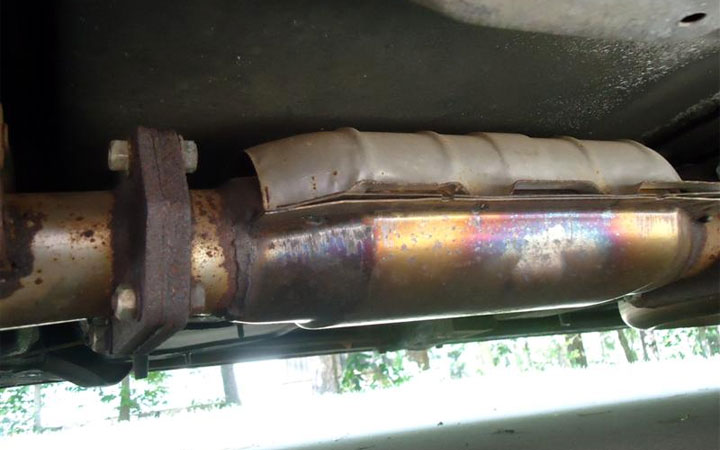
A catalytic converter is responsible for reducing the amount of pollutants that exit out of a car’s exhaust. When the air/fuel mixture in your engine is too rich, a blockage can develop in the catalytic converter over time which disrupts the airflow of the exhaust system.
This can result in stuttering, jerking, and an overall delay in responsiveness whenever you step on the gas. Besides the jerking, other symptoms may include a rotten egg odor (hydrogen sulphide), a drop in the car’s fuel efficiency, and the check engine light may come on.
You may be able to unclog minor blockages by first using a good catalytic converter cleaner. If that doesn’t work, you’ll need to take it to an auto repair shop to fix the problem which will likely include replacement of the catalytic converter.
#3 – Faulty Mass Airflow Sensor
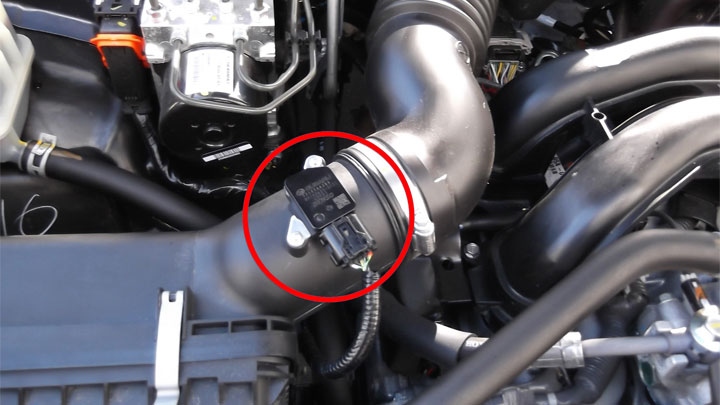
If you notice your car surging forward or jerking at high speeds, it may be due to a mass airflow sensor (MAF) that is failing. Its job is to measure the amount of air entering the engine so it can relay this info to the car’s computer.
The computer then instructs the fuel injectors to provide the right amount of fuel at the right time for proper air/fuel mixture.
With a faulty MAF sensor, you may experience your car unexpectedly jerking or surging forward while driving at higher speeds such as on the highway where it would be most noticeable.
A check engine light should be present when the mass airflow sensor is bad but you can easily confirm via an OBD2 scanner.
#4 – Bad Fuel Pump or Filter
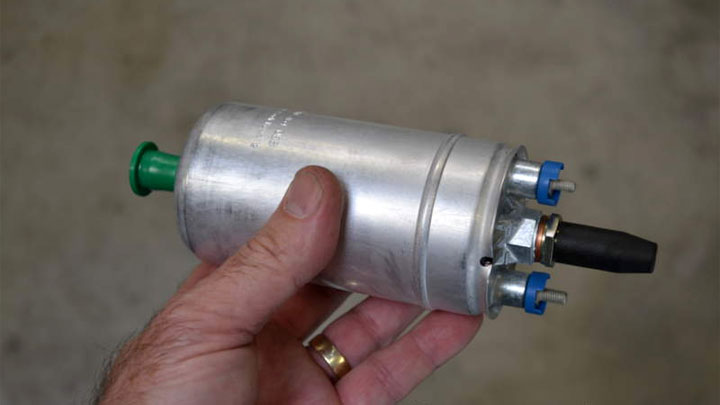
The cause of your car jerking while accelerating is often a fuel supply issue. When the correct amount of fuel is not being delivered to the engine, it’s often best to start at the beginning.
In this case it would be the car’s fuel pump. A failing fuel pump would struggle to keep up with fuel demands and cause your car to jerk or surge forward while driving.
Alternatively, you may have a clogged fuel filter that’s restricting the flow of fuel which also can cause issues as fuel delivery is inconsistent. Replacing the fuel filter is a fairly simple and inexpensive process.
#5 – Clogged Fuel Lines
When your fuel lines become clogged, it’s often due to a buildup of dirt, debris, or contaminants in the fuel itself. As a result, the fuel flow to your engine becomes restricted, causing your car to jerk when accelerating, especially at constant speeds.
Often, a dirty fuel filter, fouled up fuel injectors, and the use of low-quality fuel are to blame. And in case you’re wondering, yes, if someone pours sugar (or another foreign substance) in your gas tank, clogged fuel lines will be only the beginning.
#6 – Dirty Air Filter
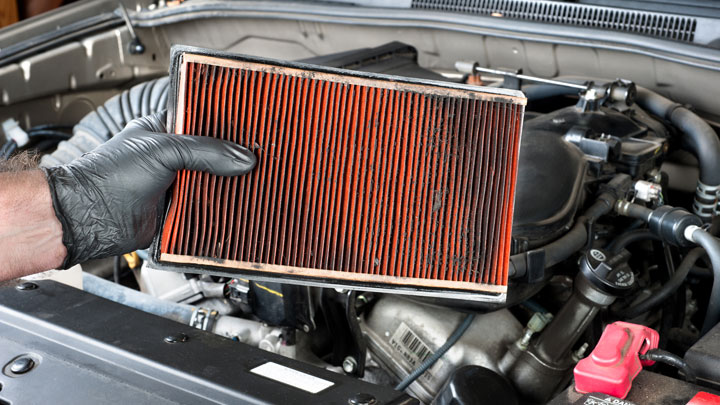
As you read this article, you’ll notice an improper air/fuel mixture is often the culprit if your car jerks or sputters when accelerating. Opposite the fuel side of things, is proper air intake.
When not enough air makes it into the combustion chamber, you’ll often get the same issues when not enough fuel.
Your car’s air filter is the first line of defense against dirt and other foreign particles. A dirty air filter will allow some particles to get into the engine, which in turn will affect performance and cause jerking.
Check the condition of your air filter. If it’s dirty, replace it. It should only cost $10-$20 and take a few minutes to replace. Alternatively, you can purchase a reusable air filter such as a K&N which allows for future cleanings instead of replacement.
A clean filter can drastically improve the lifespan of your car’s engine, including reducing or eliminating the acceleration jerks.
#7 – Faulty Spark Plugs
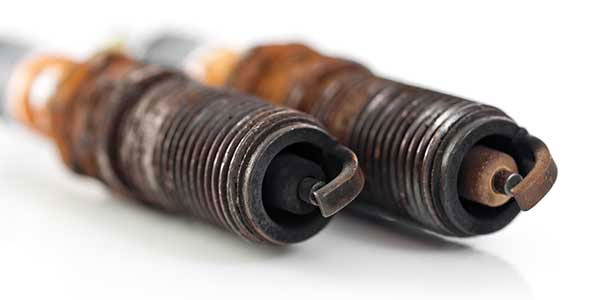
One of the most common causes is also one of the easiest to identify and fix. During the combustion process, a good spark is needed to properly ignite the fuel in each cylinder.
A bad or dirty spark plug can prevent this proper ignition and will cause the engine to misfire. While driving, it feels like your vehicle jerks or shutter when accelerating.
Fixing this problem is as easy as replacing the bad plug. If you don’t remember the last time you replaced your spark plugs, it may be a good idea to get them all changed out. This is a quick and inexpensive repair.
#8 – Low Transmission Fluid
Having low transmission fluid in your car can cause several issues, one of which includes jerking when accelerating. When your transmission fluid gets low, it can lead to issues such as gears slipping or a lack of lubrication in the transmission system, both of which can result in a jerking, jumping, or lurching sensation.
It’s crucial to regularly check and maintain the appropriate level of transmission fluid.
#9 – Distributor Cap Moisture Buildup
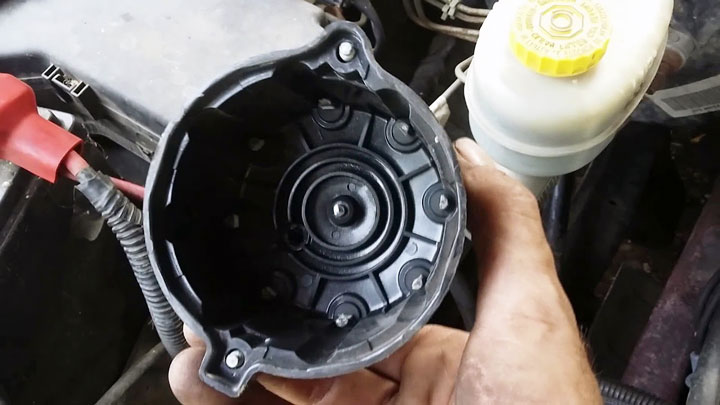
On colder days, condensation can form under the distributor cap. This mainly occurs when you have the car parked outside overnight. This moisture will cause the engine to misfire, thus your car will jerk when accelerating at low speeds.
Luckily, the problem will go away once the water is gone, but repeated moisture buildup can tax your engine over time.
You can avoid this issue altogether by ensuring your car’s parked in a garage or other protected location. A thermal cover can also help reduce the risk of condensation when shelter isn’t an option and you’re expecting colder weather.
#10 – Worn Accelerator Cable
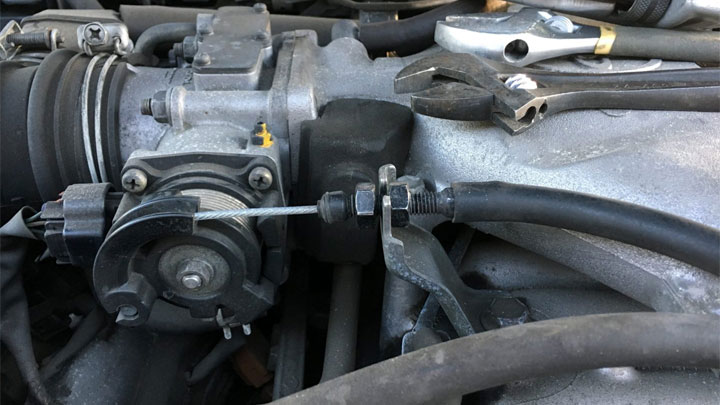
While most cars on the road use drive-by-wire electronic throttle control to accelerate, a physical accelerator cable (or throttle cable) are still found in many vehicles. It acts as a mechanical link between the gas pedal and throttle plate.
Over time, this accelerator cable can wear out. This will cause the car to respond more slowly when you press on the gas and it lurches instead of providing smooth acceleration. You can usually see damage to the cable’s outer coating when examining it, making this problem easy to diagnose.
A damaged cable requires immediate attention, as the car can stop functioning when the cable breaks. Be sure to take it to a trusted mechanic to ensure the replacement is done right.
See Also: Drive-by-Wire vs Drive-by-Cable
#11 – Bad Transmission Control Module
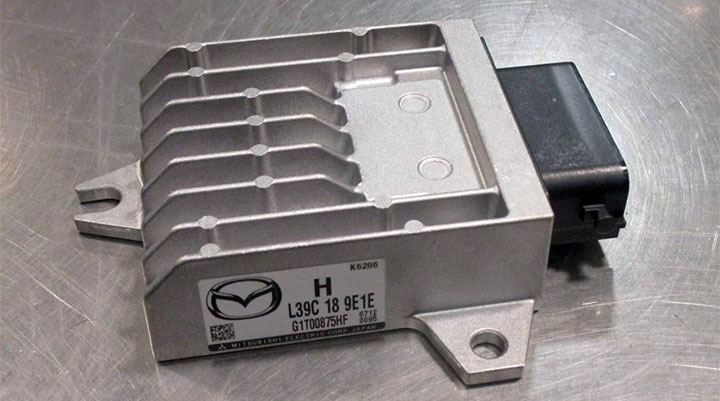
If you drive an automatic transmission car and notice your car jerking or bucking right around the time your transmission changes gears, you may have a faulty transmission control module (or solenoid).
This part is responsible for gear changes when you accelerate. Gear shifts may be delayed or unpredictable and are often harsh and may feel like the car jerks.
While not a common point of failure, it’s worth considering while you troubleshoot.
Check Engine Light vs No Check Engine Light
When the Check Engine Light Is On
When your car jerks and the check engine light is on, it’s a clear indication that there is a problem needing attention. In this case, the most likely issues could be:
- Dirty or clogged fuel injectors
- Worn-out spark plugs
- Bad O2 Sensor
- Fuel pump malfunction
To diagnose the issue, you should get your car scanned with an OBD2 scanner, which will help you identify the specific problem causing the check engine light to come on. Based on the code retrieved, you can take the necessary steps to fix the problem.
When There Is No Check Engine Light
If your car jerks while accelerating and there’s no check engine light, you don’t need to panic, but don’t ignore it either. When the CEL is not illuminated, here are the :
- A blocked or dirty air filter
- Low transmission fluid
- Clogged catalytic converter
In this case, it’s advisable to first check the air filter and replace it if necessary and then check your transmission fluid level. Also, have a mechanic check the various sensors and the catalytic converter as these could be causing the jerking issue without triggering the check engine light.
Maintenance and Repair
Tune-up
To prevent your car from jerking or stuttering while driving, consider performing regular tune-ups. This includes replacing spark plugs, checking ignition coils, and inspecting other essential components like sensors and filters. A routine tune-up can help address performance issues before they lead to more severe problems.
Fuel Injector Cleaner
Keep your fuel injectors clean by using a high-quality fuel injector cleaner every few thousand miles. This prevents buildup and ensures that your engine receives an optimal fuel and air mixture for smooth acceleration.
Simply follow the product’s instructions and pour the cleaner into your gas tank during a fill-up.
Catalytic Converter Cleaner
A clogged catalytic converter can cause your car to jerk or hesitate when accelerating. Use a catalytic converter cleaner or fuel system cleaner to remove deposits and restore proper function.
Auto Repair Shop
If you’re unable to diagnose or resolve the issue causing your car to jerk when accelerating, consult a professional at an auto repair shop. They have the expertise and equipment to identify the root of the problem and perform the necessary repairs.
- Replace the Engine or Replace the Car? (11 Factors to Consider) - Apr 11, 2024
- Plastic Piece Dragging Under Your Car? (What It Is and What To Do) - Mar 21, 2024
- Timing Belt vs Timing Chain (What’s the Difference?) - Feb 27, 2024
